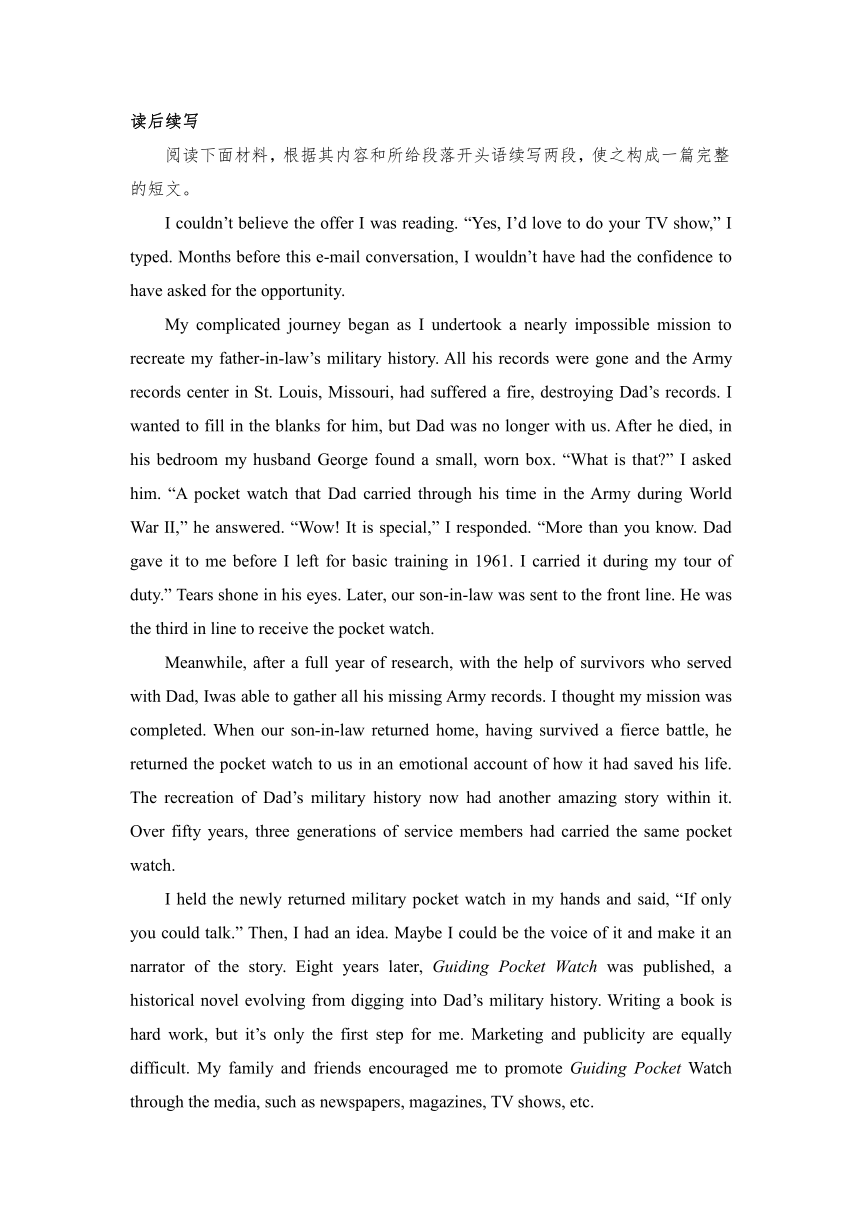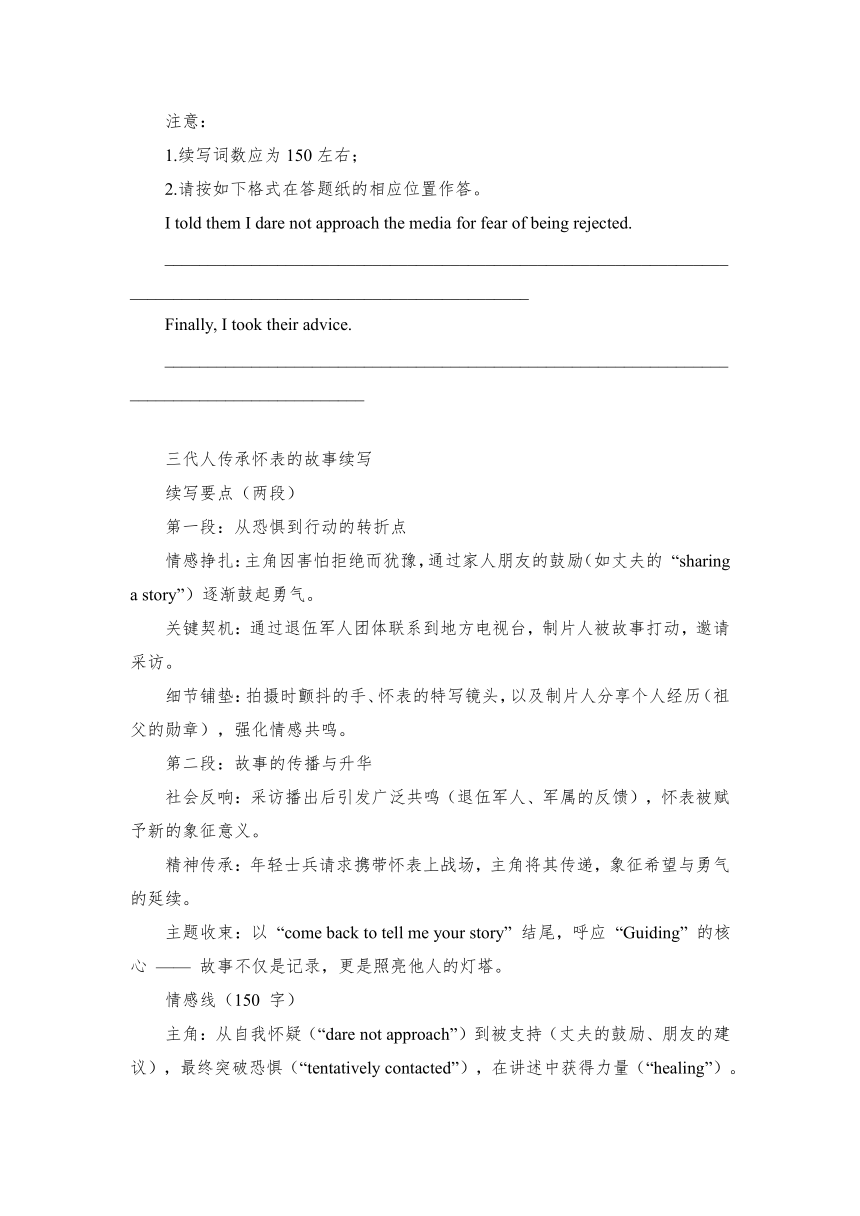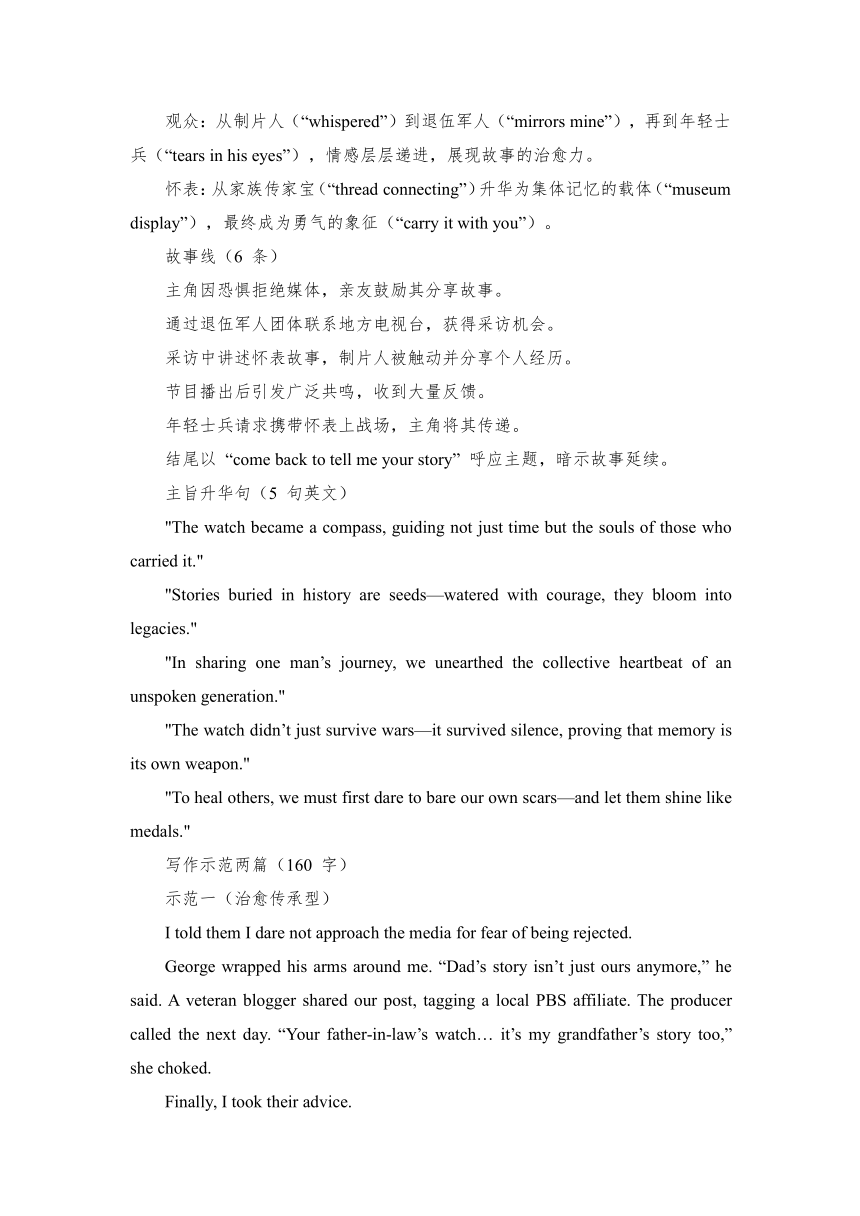读后续写:三代人传承怀表的故事 讲义-2025届山东省临沂市高三一模考试英语试卷
文档属性
| 名称 | 读后续写:三代人传承怀表的故事 讲义-2025届山东省临沂市高三一模考试英语试卷 |  | |
| 格式 | docx | ||
| 文件大小 | 21.3KB | ||
| 资源类型 | 教案 | ||
| 版本资源 | 人教版(2019) | ||
| 科目 | 英语 | ||
| 更新时间 | 2025-03-04 14:26:52 | ||
图片预览



文档简介
读后续写
阅读下面材料,根据其内容和所给段落开头语续写两段,使之构成一篇完整的短文。
I couldn’t believe the offer I was reading. “Yes, I’d love to do your TV show,” I typed. Months before this e-mail conversation, I wouldn’t have had the confidence to have asked for the opportunity.
My complicated journey began as I undertook a nearly impossible mission to recreate my father-in-law’s military history. All his records were gone and the Army records center in St. Louis, Missouri, had suffered a fire, destroying Dad’s records. I wanted to fill in the blanks for him, but Dad was no longer with us. After he died, in his bedroom my husband George found a small, worn box. “What is that ” I asked him. “A pocket watch that Dad carried through his time in the Army during World War II,” he answered. “Wow! It is special,” I responded. “More than you know. Dad gave it to me before I left for basic training in 1961. I carried it during my tour of duty.” Tears shone in his eyes. Later, our son-in-law was sent to the front line. He was the third in line to receive the pocket watch.
Meanwhile, after a full year of research, with the help of survivors who served with Dad, Iwas able to gather all his missing Army records. I thought my mission was completed. When our son-in-law returned home, having survived a fierce battle, he returned the pocket watch to us in an emotional account of how it had saved his life. The recreation of Dad’s military history now had another amazing story within it. Over fifty years, three generations of service members had carried the same pocket watch.
I held the newly returned military pocket watch in my hands and said, “If only you could talk.” Then, I had an idea. Maybe I could be the voice of it and make it an narrator of the story. Eight years later, Guiding Pocket Watch was published, a historical novel evolving from digging into Dad’s military history. Writing a book is hard work, but it’s only the first step for me. Marketing and publicity are equally difficult. My family and friends encouraged me to promote Guiding Pocket Watch through the media, such as newspapers, magazines, TV shows, etc.
注意:
1.续写词数应为150左右;
2.请按如下格式在答题纸的相应位置作答。
I told them I dare not approach the media for fear of being rejected.
_______________________________________________________________________________________________________________
Finally, I took their advice.
____________________________________________________________________________________________
三代人传承怀表的故事续写
续写要点(两段)
第一段:从恐惧到行动的转折点
情感挣扎:主角因害怕拒绝而犹豫,通过家人朋友的鼓励(如丈夫的 “sharing a story”)逐渐鼓起勇气。
关键契机:通过退伍军人团体联系到地方电视台,制片人被故事打动,邀请采访。
细节铺垫:拍摄时颤抖的手、怀表的特写镜头,以及制片人分享个人经历(祖父的勋章),强化情感共鸣。
第二段:故事的传播与升华
社会反响:采访播出后引发广泛共鸣(退伍军人、军属的反馈),怀表被赋予新的象征意义。
精神传承:年轻士兵请求携带怀表上战场,主角将其传递,象征希望与勇气的延续。
主题收束:以 “come back to tell me your story” 结尾,呼应 “Guiding” 的核心 —— 故事不仅是记录,更是照亮他人的灯塔。
情感线(150 字)
主角:从自我怀疑(“dare not approach”)到被支持(丈夫的鼓励、朋友的建议),最终突破恐惧(“tentatively contacted”),在讲述中获得力量(“healing”)。
观众:从制片人(“whispered”)到退伍军人(“mirrors mine”),再到年轻士兵(“tears in his eyes”),情感层层递进,展现故事的治愈力。
怀表:从家族传家宝(“thread connecting”)升华为集体记忆的载体(“museum display”),最终成为勇气的象征(“carry it with you”)。
故事线(6 条)
主角因恐惧拒绝媒体,亲友鼓励其分享故事。
通过退伍军人团体联系地方电视台,获得采访机会。
采访中讲述怀表故事,制片人被触动并分享个人经历。
节目播出后引发广泛共鸣,收到大量反馈。
年轻士兵请求携带怀表上战场,主角将其传递。
结尾以 “come back to tell me your story” 呼应主题,暗示故事延续。
主旨升华句(5 句英文)
"The watch became a compass, guiding not just time but the souls of those who carried it."
"Stories buried in history are seeds—watered with courage, they bloom into legacies."
"In sharing one man’s journey, we unearthed the collective heartbeat of an unspoken generation."
"The watch didn’t just survive wars—it survived silence, proving that memory is its own weapon."
"To heal others, we must first dare to bare our own scars—and let them shine like medals."
写作示范两篇(160 字)
示范一(治愈传承型)
I told them I dare not approach the media for fear of being rejected.
George wrapped his arms around me. “Dad’s story isn’t just ours anymore,” he said. A veteran blogger shared our post, tagging a local PBS affiliate. The producer called the next day. “Your father-in-law’s watch… it’s my grandfather’s story too,” she choked.
Finally, I took their advice.
On air, I traced the watch’s scratches. “Each mark is a battle—both seen and unseen.” The producer’s eyes glistened. “My grandfather’s dog tags were lost in ’Nam. This… this is closure.”
The episode went viral. A WWII nurse mailed a photo of her late husband’s watch, identical to Dad’s. “They were in the same battalion,” she wrote. At a book signing, a Gold Star mother pressed a folded flag into my hand. “Tell their stories,” she whispered.
示范二(希望传递型)
I told them I dare not approach the media for fear of being rejected.
My agent persisted. “Your story isn’t about a watch—it’s about love defying time.” She arranged a podcast interview. As I spoke, the host’s voice trembled. “My dad’s unit was ambushed. He never came home.”
Finally, I took their advice.
The podcast trended, and a military historian invited me to the Pentagon. There, I met a young lieutenant. “My platoon’s deploying. Can I borrow your words ” I placed the watch in his palm. “Keep it wound,” I said. “And keep writing your chapter.”
Months later, a letter arrived. Inside: the watch, and a photo of the lieutenant grinning with his squad. “It kept us on time,” he wrote. “Now it’s your turn to keep the story going.”
参考答案
I told them I dare not approach the media for fear of being rejected. My family and friends listened patiently. My husband George held my hands and said, “You have done such a remarkable job with this book. It’s a story that deserves to be told. Don’t let the fear of rejection stop you.” Our daughter also chimed in, “Mom, you’ve overcome so many difficulties in writing this book. This is just another challenge, and I know you can face it bravely.” Their words touched my heart deeply, but I still hesitated, imagining all the possible negative responses.
Finally, I took their advice. I gathered my courage and started reaching out to different media platforms. To my great surprise, many showed interest in my book. The TV show that I e-mailed responded quickly and warmly. When the day of the TV show arrived, I was nervous but excited. On the stage, I held the pocket watch in my hand and began to tell the moving story of three generations. The audience was deeply touched, and I realized that I had made the right decision and that my book could bring inspiration and warmth to more people.
阅读下面材料,根据其内容和所给段落开头语续写两段,使之构成一篇完整的短文。
I couldn’t believe the offer I was reading. “Yes, I’d love to do your TV show,” I typed. Months before this e-mail conversation, I wouldn’t have had the confidence to have asked for the opportunity.
My complicated journey began as I undertook a nearly impossible mission to recreate my father-in-law’s military history. All his records were gone and the Army records center in St. Louis, Missouri, had suffered a fire, destroying Dad’s records. I wanted to fill in the blanks for him, but Dad was no longer with us. After he died, in his bedroom my husband George found a small, worn box. “What is that ” I asked him. “A pocket watch that Dad carried through his time in the Army during World War II,” he answered. “Wow! It is special,” I responded. “More than you know. Dad gave it to me before I left for basic training in 1961. I carried it during my tour of duty.” Tears shone in his eyes. Later, our son-in-law was sent to the front line. He was the third in line to receive the pocket watch.
Meanwhile, after a full year of research, with the help of survivors who served with Dad, Iwas able to gather all his missing Army records. I thought my mission was completed. When our son-in-law returned home, having survived a fierce battle, he returned the pocket watch to us in an emotional account of how it had saved his life. The recreation of Dad’s military history now had another amazing story within it. Over fifty years, three generations of service members had carried the same pocket watch.
I held the newly returned military pocket watch in my hands and said, “If only you could talk.” Then, I had an idea. Maybe I could be the voice of it and make it an narrator of the story. Eight years later, Guiding Pocket Watch was published, a historical novel evolving from digging into Dad’s military history. Writing a book is hard work, but it’s only the first step for me. Marketing and publicity are equally difficult. My family and friends encouraged me to promote Guiding Pocket Watch through the media, such as newspapers, magazines, TV shows, etc.
注意:
1.续写词数应为150左右;
2.请按如下格式在答题纸的相应位置作答。
I told them I dare not approach the media for fear of being rejected.
_______________________________________________________________________________________________________________
Finally, I took their advice.
____________________________________________________________________________________________
三代人传承怀表的故事续写
续写要点(两段)
第一段:从恐惧到行动的转折点
情感挣扎:主角因害怕拒绝而犹豫,通过家人朋友的鼓励(如丈夫的 “sharing a story”)逐渐鼓起勇气。
关键契机:通过退伍军人团体联系到地方电视台,制片人被故事打动,邀请采访。
细节铺垫:拍摄时颤抖的手、怀表的特写镜头,以及制片人分享个人经历(祖父的勋章),强化情感共鸣。
第二段:故事的传播与升华
社会反响:采访播出后引发广泛共鸣(退伍军人、军属的反馈),怀表被赋予新的象征意义。
精神传承:年轻士兵请求携带怀表上战场,主角将其传递,象征希望与勇气的延续。
主题收束:以 “come back to tell me your story” 结尾,呼应 “Guiding” 的核心 —— 故事不仅是记录,更是照亮他人的灯塔。
情感线(150 字)
主角:从自我怀疑(“dare not approach”)到被支持(丈夫的鼓励、朋友的建议),最终突破恐惧(“tentatively contacted”),在讲述中获得力量(“healing”)。
观众:从制片人(“whispered”)到退伍军人(“mirrors mine”),再到年轻士兵(“tears in his eyes”),情感层层递进,展现故事的治愈力。
怀表:从家族传家宝(“thread connecting”)升华为集体记忆的载体(“museum display”),最终成为勇气的象征(“carry it with you”)。
故事线(6 条)
主角因恐惧拒绝媒体,亲友鼓励其分享故事。
通过退伍军人团体联系地方电视台,获得采访机会。
采访中讲述怀表故事,制片人被触动并分享个人经历。
节目播出后引发广泛共鸣,收到大量反馈。
年轻士兵请求携带怀表上战场,主角将其传递。
结尾以 “come back to tell me your story” 呼应主题,暗示故事延续。
主旨升华句(5 句英文)
"The watch became a compass, guiding not just time but the souls of those who carried it."
"Stories buried in history are seeds—watered with courage, they bloom into legacies."
"In sharing one man’s journey, we unearthed the collective heartbeat of an unspoken generation."
"The watch didn’t just survive wars—it survived silence, proving that memory is its own weapon."
"To heal others, we must first dare to bare our own scars—and let them shine like medals."
写作示范两篇(160 字)
示范一(治愈传承型)
I told them I dare not approach the media for fear of being rejected.
George wrapped his arms around me. “Dad’s story isn’t just ours anymore,” he said. A veteran blogger shared our post, tagging a local PBS affiliate. The producer called the next day. “Your father-in-law’s watch… it’s my grandfather’s story too,” she choked.
Finally, I took their advice.
On air, I traced the watch’s scratches. “Each mark is a battle—both seen and unseen.” The producer’s eyes glistened. “My grandfather’s dog tags were lost in ’Nam. This… this is closure.”
The episode went viral. A WWII nurse mailed a photo of her late husband’s watch, identical to Dad’s. “They were in the same battalion,” she wrote. At a book signing, a Gold Star mother pressed a folded flag into my hand. “Tell their stories,” she whispered.
示范二(希望传递型)
I told them I dare not approach the media for fear of being rejected.
My agent persisted. “Your story isn’t about a watch—it’s about love defying time.” She arranged a podcast interview. As I spoke, the host’s voice trembled. “My dad’s unit was ambushed. He never came home.”
Finally, I took their advice.
The podcast trended, and a military historian invited me to the Pentagon. There, I met a young lieutenant. “My platoon’s deploying. Can I borrow your words ” I placed the watch in his palm. “Keep it wound,” I said. “And keep writing your chapter.”
Months later, a letter arrived. Inside: the watch, and a photo of the lieutenant grinning with his squad. “It kept us on time,” he wrote. “Now it’s your turn to keep the story going.”
参考答案
I told them I dare not approach the media for fear of being rejected. My family and friends listened patiently. My husband George held my hands and said, “You have done such a remarkable job with this book. It’s a story that deserves to be told. Don’t let the fear of rejection stop you.” Our daughter also chimed in, “Mom, you’ve overcome so many difficulties in writing this book. This is just another challenge, and I know you can face it bravely.” Their words touched my heart deeply, but I still hesitated, imagining all the possible negative responses.
Finally, I took their advice. I gathered my courage and started reaching out to different media platforms. To my great surprise, many showed interest in my book. The TV show that I e-mailed responded quickly and warmly. When the day of the TV show arrived, I was nervous but excited. On the stage, I held the pocket watch in my hand and began to tell the moving story of three generations. The audience was deeply touched, and I realized that I had made the right decision and that my book could bring inspiration and warmth to more people.
